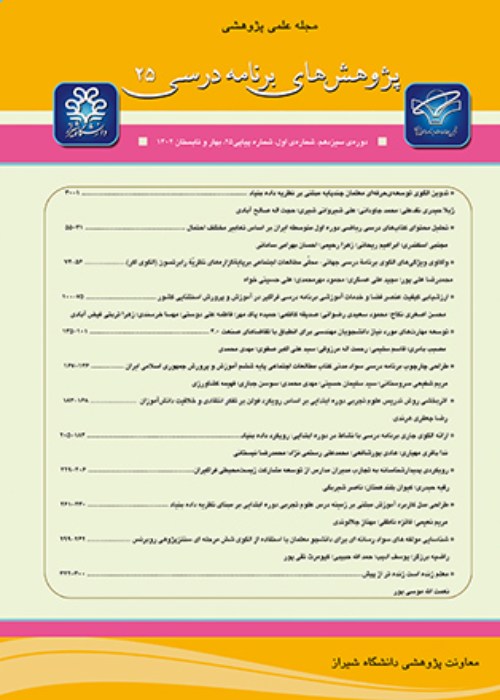Effectiveness of Self-Determination Skills Training on Academic Self-Regulation and Psychological Hardiness among Students
One of the main objectives of curricula is to create self-regulation ability in students and increase their perseverance and commitment to the fulfillment of academic activities. It seems that the development and improvement of the motivational skills, which provide students with the opportunities of selectivity, control, supervision, and competence exposure, can assist them with the compilation of goals, identification of the necessary steps towards goal attainment, solving of problems, and removal of the impediments to achieving these goals, and this issue is realized by increases in some skills such as self-determination. Self-determination is a metatheory about human motivation. It is evolved out of the studies on intrinsic and extrinsic motivation and extensively applied to successes in relationships with parents, education, healthcare, sports, and psychotherapy. In step with the self-determination theory, humans are innately active and enjoy a natural desire for learning and growth. Recent investigations have rendered encouraging evidence respecting the effectiveness of training self-determination skills. With regard to the positive consequences of self-determination, the educational system must pave the way for students to become self-determinant. Indeed, the fostering of self-determination skills in educational environments helps students improve their quality of life, operate independently in their lives, have the maximum control over and responsibility for their lives, and increment their rate of participation in and cooperation with curriculum development and decision-making in educational processes. The present study aims to investigate the effectiveness of training self-determination skills on students’ academic self-regulation (external regulation, internalized regulation, identified regulation, and internal regulation) and development of psychological hardiness (challenge, commitment, and control).
1-Training self-determination skills lead to decrease of students’ extrinsic regulation, interjected regulation, identified regulation and increase of their intrinsic regulation
2-Self-determination skills training leads to increase of students’ psychological hardiness (commitment, challenge and control).
The current study was quasi-experimental with pre-test post-test design and control group in which self-determination skills training, was considered as independent variable, and types of academic self-regulation (extrinsic regulation, interjected regulation, identified regulation and intrinsic regulation) and dimensions of psychological hardiness (commitment, challenge and control) were considered as dependent variables. The subjects included 120 eighth-grade students in Shiraz city in the academic year of 2018-19. In order to select subjects, four schools (two girl schools and two boy schools) were selected from junior high schools. One class of eight grade was selected from every school. Classes assigned to experimental and control groups (two experimental groups and two control groups), randomly. Prior to the beginning of the training, the Academic Self-Regulation Questionnaire (Ryan & Connell, 1989) and the Personal Views Survey Questionnaire (Kobasa et al., 1990) were administered to experimental and control groups. Self-determination skills were taught to experimental groups during 10 sessions and then post-test was performed on experimental and control groups. Self-determination skills were taught through the design and application of a training package based on the principles and elements of the model (Field & Hoffman, 1994) and its adaptation to the normal student sample. In the Field and Hoffman model, these steps include knowing oneself and one's environment, valuing oneself, planning, acting, the outcome of experience, and learning.
Data were analyzed by using statistical method of MANCOVA and ANCOVA statistical analysis methods. Findings showed self-determination skills training result to reduce extrinsic regulation, interjected regulation, and identified regulation and increase intrinsic regulation, significantly. Also, self-determination skills training increased student's psychological hardiness and its dimensions (commitment, challenge and control).
The present study presents evidence concerning the effectiveness of training self-determination skills on academic self-regulation and psychological hardiness. The majority of studies conducted in this area, especially in Iran, are correlational, which limits the possibility of the causative interpretation of the results. However, the present study measures trained self-determination skills and their effects on academic self-regulation and psychological hardiness. The results of the study revealed the importance of noticing self-determination skills in curriculum development since these skills enhance students’ self-regulation and increase their psychological hardiness. In this method, due to the learner-centered nature of the self-determination approach, students are divided into small groups and given problems that are to be solved by group work, discussion, and public participation. During this process, the problems are evaluated and analyzed by the use of discussions and negotiations. In fact, students’ senses of further belongingness to the school and class activities and interests in reviewing and revising learning processes are the consequences of these activities. Lastly, self-determination training helps individuals with better recognition of their worldviews, strengths, weaknesses, and goals. This awareness can give rise to psychological hardiness and transform them into self-regulated individuals. As practically possible, curriculums should include self-determination skills training and textbooks should contain motivational steps of self-determination skills. This can be achieved through the training of specialized and experienced educators in the field of self-determination education and the holding of part-time training workshops in schools.
- حق عضویت دریافتی صرف حمایت از نشریات عضو و نگهداری، تکمیل و توسعه مگیران میشود.
- پرداخت حق اشتراک و دانلود مقالات اجازه بازنشر آن در سایر رسانههای چاپی و دیجیتال را به کاربر نمیدهد.


